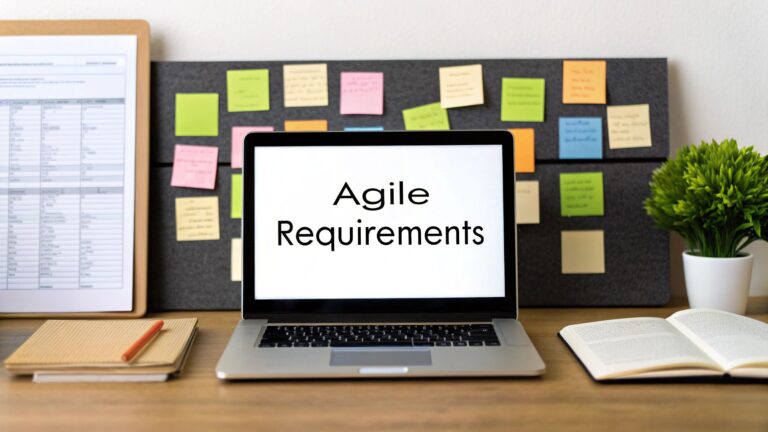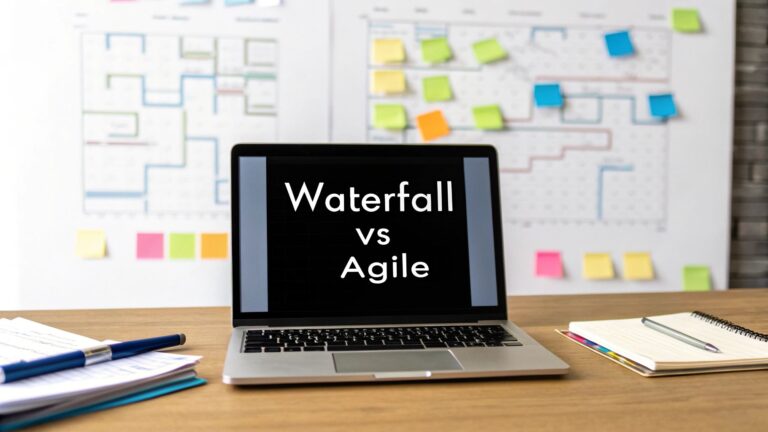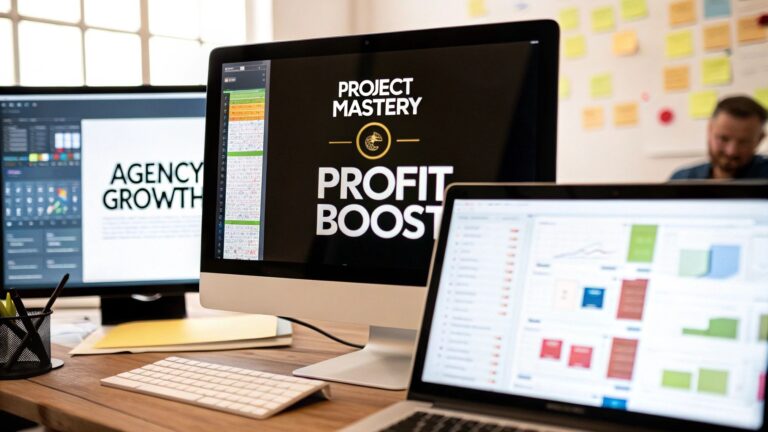12 Best AI Tools for Project Management in 2025
Juggling deadlines, allocating resources, and keeping stakeholders informed is a constant battle. For project managers, especially in fast-paced B2B and SaaS environments, the administrative overhead can quickly consume the time needed for strategic planning and team leadership. Traditional PM software helps organize tasks, but it often requires significant manual input, from creating schedules to generating status reports. This is precisely the problem the best AI tools for project management are built to solve.
These intelligent platforms move beyond simple task tracking. They automate tedious administrative work, predict potential roadblocks, optimize resource allocation, and even draft project updates for you. The goal isn't just to do the same work faster; it's to fundamentally change how you manage projects, freeing up your team to focus on high-value, creative, and strategic initiatives. This shift transforms project management from a reactive, checklist-driven function into a proactive, data-informed powerhouse for organizational growth.
This comprehensive guide is designed to help you navigate this new generation of software. We've gone beyond marketing hype to provide a detailed analysis of the top contenders, including ClickUp, Asana, Motion, and Wrike. You'll find a breakdown of each platform's unique AI capabilities, ideal use cases, and honest limitations. To help you make a confident decision, every review includes:
- In-depth feature analysis: A close look at what the AI actually does.
- Practical use-case scenarios: See how these tools function in real-world situations.
- Direct links and screenshots: Visualize the platform and access it easily.
- Clear pricing information: Understand the investment required for your team.
Our goal is to equip you with the insights needed to select the right AI-powered platform that will scale with your business and truly enhance your project management workflow.
1. Streamline Project Management Using Ai Automation
MakeAutomation.co offers a standout solution for B2B and SaaS companies looking to integrate intelligent automation directly into their project management ecosystem. Rather than providing a single, off-the-shelf software, this service delivers tailored AI automation frameworks designed to replace manual, error-prone workflows. It's a comprehensive, hands-on approach that makes it one of the best AI tools for project management for businesses focused on scaling efficiently and maximizing operational ROI.
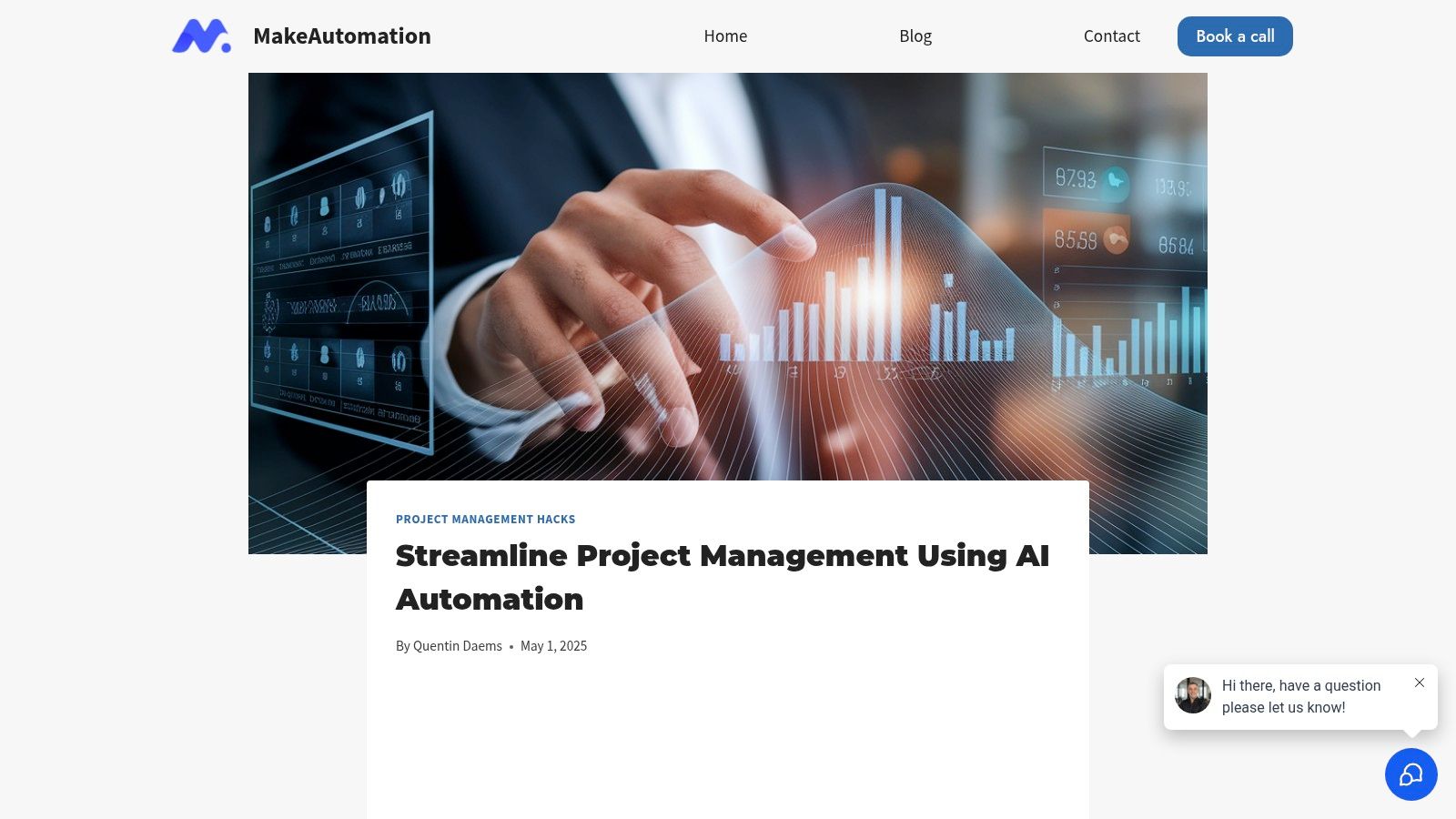
The core strength of MakeAutomation.co lies in its bespoke service model. Instead of just selling a tool, the team provides end-to-end support, including initial consultation, framework development, complete documentation, and hands-on implementation. This ensures that the AI solutions are perfectly aligned with a company’s specific project management challenges, whether that involves automating task assignments, streamlining client onboarding, or coordinating complex team projects. For instance, exploring how tools like Reclaim AI for enhanced productivity showcases the power of AI in streamlining everyday tasks, and MakeAutomation.co applies this principle on a much broader, more customized scale.
Key Strengths and Use Cases
MakeAutomation.co excels where generic project management tools fall short. It’s not just about adding an AI feature; it’s about rebuilding foundational processes with intelligence.
- Ideal For: SaaS companies, digital agencies, and B2B service providers managing multiple complex projects.
- Practical Application: Automate the entire client project kickoff process, from proposal acceptance to task creation and resource allocation in your PM tool, eliminating hours of manual data entry.
- Unique Advantage: The combination of tailored frameworks and expert support ensures the automation scales with your business, a feature often missing from rigid, one-size-fits-all platforms.
| Feature Analysis | Description |
|---|---|
| Custom AI Frameworks | Solutions are built specifically for your project workflows, not generic templates. |
| End-to-End Support | Includes consultation, implementation, and documentation for seamless integration. |
| Scalability | Designed to grow with your business, adapting to increasing project complexity and team size. |
| Error Reduction | Automation minimizes human error in repetitive tasks like data transfer and reporting. |
While this service requires an initial investment in setup and discovery, the long-term benefits of enhanced productivity, reduced operational costs, and accelerated project delivery offer a significant return. It’s a strategic investment for organizations ready to fully commit to leveraging AI automation for their business.
2. ClickUp
ClickUp positions itself as an all-in-one productivity platform, and its integration of ClickUp AI elevates it into a formidable contender among the best AI tools for project management. More than just a task manager, it uses AI to streamline complex workflows, summarize lengthy comment threads, and even generate project outlines from a simple prompt. Its core strength lies in its incredible versatility, adapting to the needs of a solo founder, a digital agency, or a large B2B SaaS team.
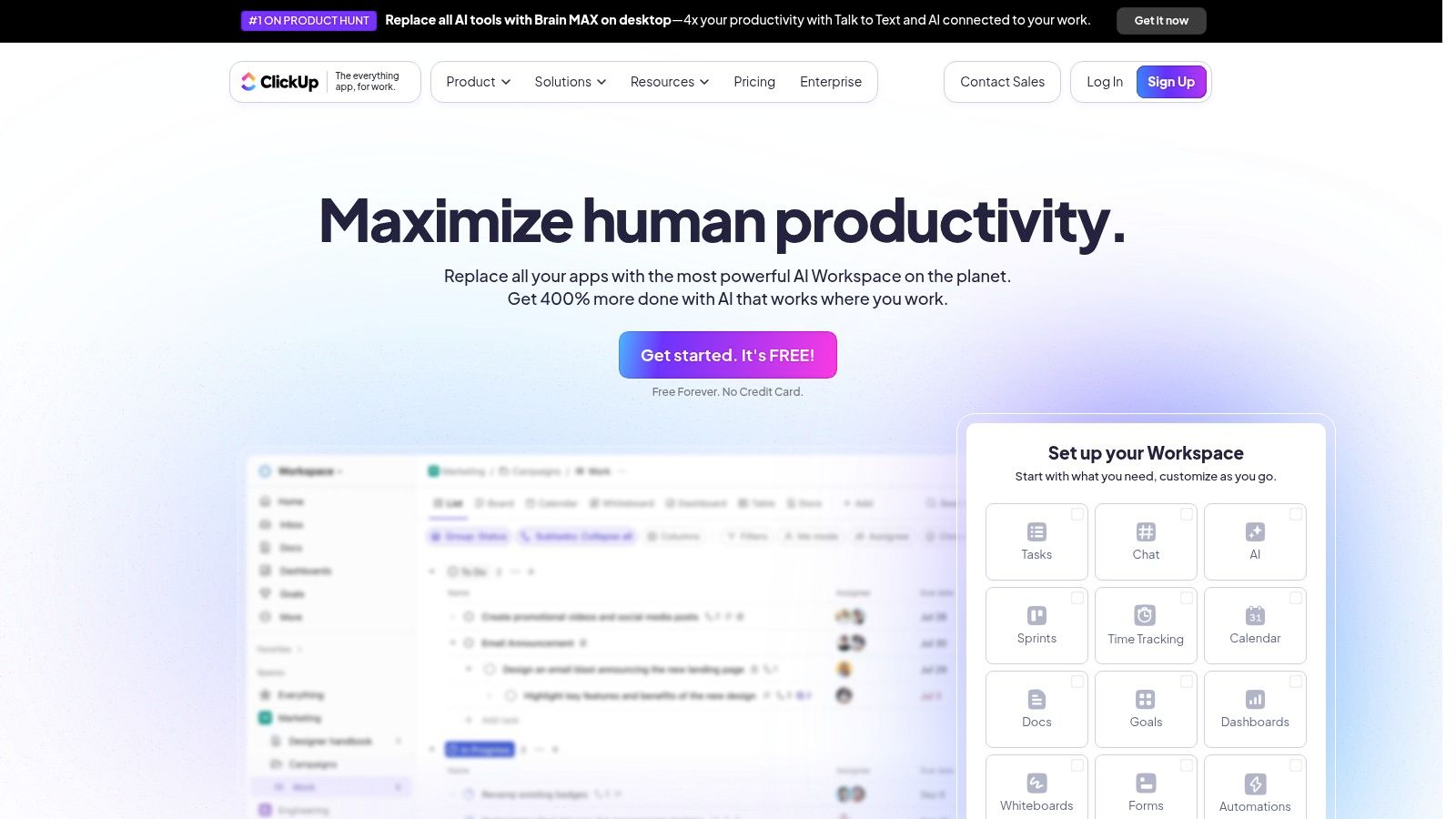
The platform’s AI is woven directly into everyday project activities. For instance, you can use it to automatically generate subtasks for a larger epic, write progress updates for stakeholders, or even suggest next steps based on project goals. This built-in intelligence helps reduce the manual overhead that often slows teams down, allowing them to focus on strategic execution rather than administrative upkeep.
Key Features & Use Cases
- AI-Powered Summaries: Instantly condense long task descriptions, comment chains, or documents into scannable summaries to quickly get up to speed.
- Action Item Generation: The AI can scan meeting notes or documents and automatically pull out actionable tasks, assigning them to the relevant team members.
- Predictive Analytics: While still evolving, ClickUp's AI offers insights into potential project roadblocks and helps with resource allocation by forecasting team capacity.
- Customizable Views: Teams can switch between List, Board, Calendar, and Gantt views, ensuring everyone sees project data in the format that works best for them.
Limitations and Pricing
The platform's immense customization is a double-edged sword, presenting a steeper learning curve for new users compared to simpler tools. While powerful, its offline functionality is also limited, which can be a drawback for teams on the go.
ClickUp offers a generous Free Forever plan suitable for personal use. Paid plans start with the Unlimited tier at $7 per member/month, which unlocks more features and storage. The Business plan at $12 per member/month adds more advanced features, and the Enterprise plan offers custom pricing for larger organizations needing enhanced security and support. Access to ClickUp AI is an add-on available for $5 per member/month on all paid plans.
Website: https://clickup.com/
3. Asana
Asana has long been a heavyweight in the project management space, known for its clean interface and focus on team collaboration. With the integration of Asana Intelligence, it solidifies its position as one of the best AI tools for project management by infusing smart automation and insights directly into its core functionality. This AI layer helps teams clarify goals, automate routine work, and gain real-time visibility into project progress without adding complexity. Its strength lies in making sophisticated project tracking accessible and visually intuitive for teams of all sizes.
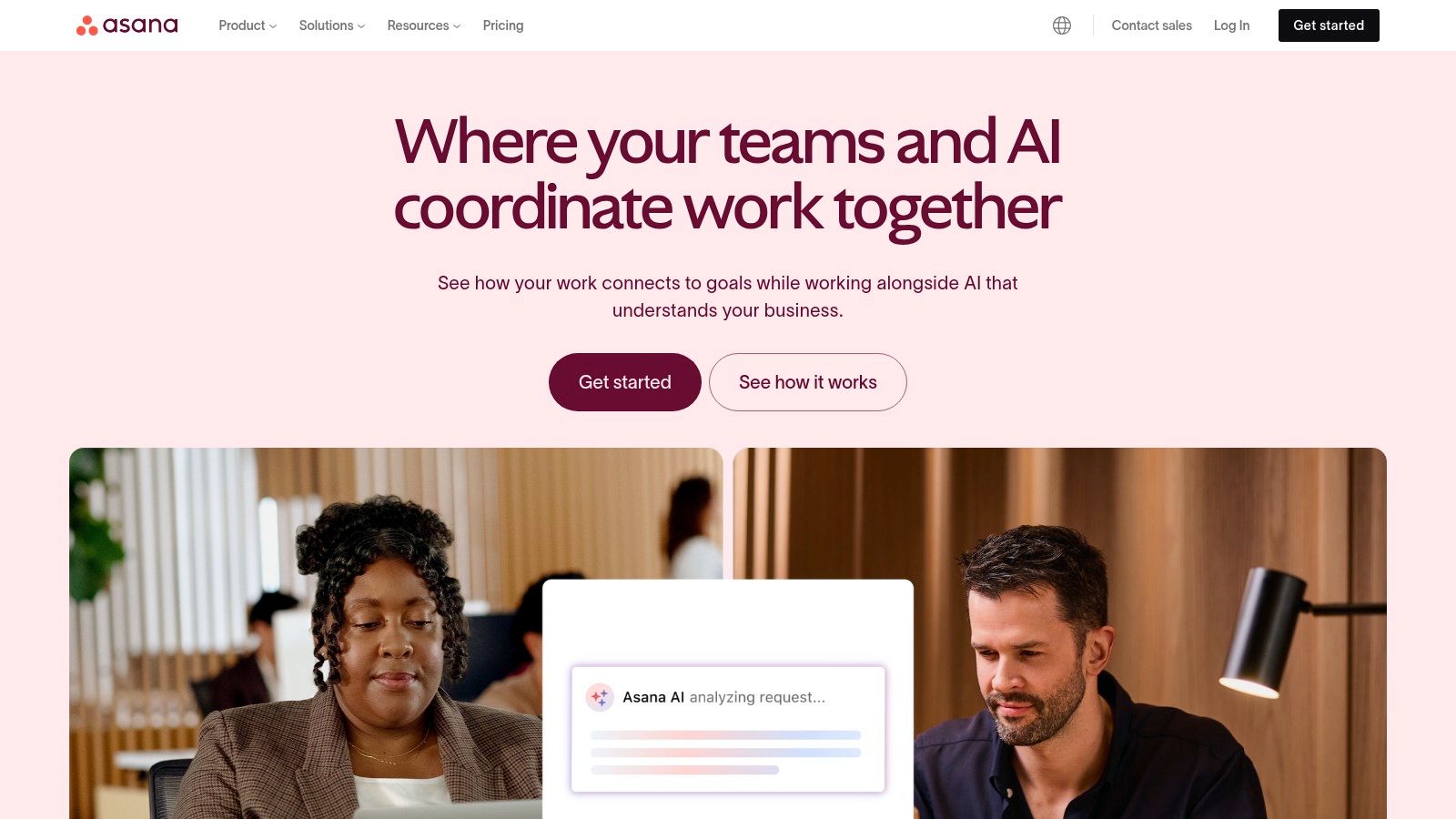
The AI features are designed to reduce friction and enhance strategic focus. For example, Smart fields can auto-populate task details, and Smart summaries provide quick digests of project status, saving managers valuable time. By handling the manual work of organizing tasks and providing status updates, Asana's AI allows teams to concentrate on hitting their milestones and adapting to changing priorities, making it a powerful ally for fast-moving B2B and SaaS companies.
Key Features & Use Cases
- Smart Answers & Summaries: Ask questions about project status, risks, or team workload in natural language and get instant, context-aware answers and summaries.
- AI-Driven Workflow Automation: Use Rules to automate routine tasks, such as assigning work, moving tasks between project stages, and sending notifications to stakeholders.
- Goal & Portfolio Management: The AI helps connect daily tasks to broader strategic objectives, highlighting work that is at-risk or off-track in real-time.
- Visual Project Tracking: Leverage Timeline, Boards, and Calendar views to visualize project plans and dependencies, with AI providing insights on potential bottlenecks.
Limitations and Pricing
While the visual interface is a major pro, it can be overwhelming for very simple projects, and some users find the sheer number of features leads to a cluttered workspace if not managed properly. Furthermore, the most powerful AI capabilities are reserved for premium plans.
Asana offers a robust Basic plan that is free forever for teams of up to 10. The paid plans start with the Starter tier at $10.99 per user/month, followed by the Advanced tier at $24.99 per user/month, which unlocks portfolio management and advanced reporting. Asana Intelligence is included in the Advanced and Enterprise tiers, with select features available on the Starter plan.
Website: https://asana.com/
4. Notion
Notion has evolved from a powerful note-taking app into a fully-fledged connected workspace, making it one of the most flexible AI tools for project management available. Its core strength lies in its modular, database-driven structure, which allows teams to build custom project dashboards, wikis, and task lists from scratch. With the integration of Notion AI, this customizability becomes supercharged, enabling users to automate summaries, brainstorm ideas, and draft content directly within their project documents.
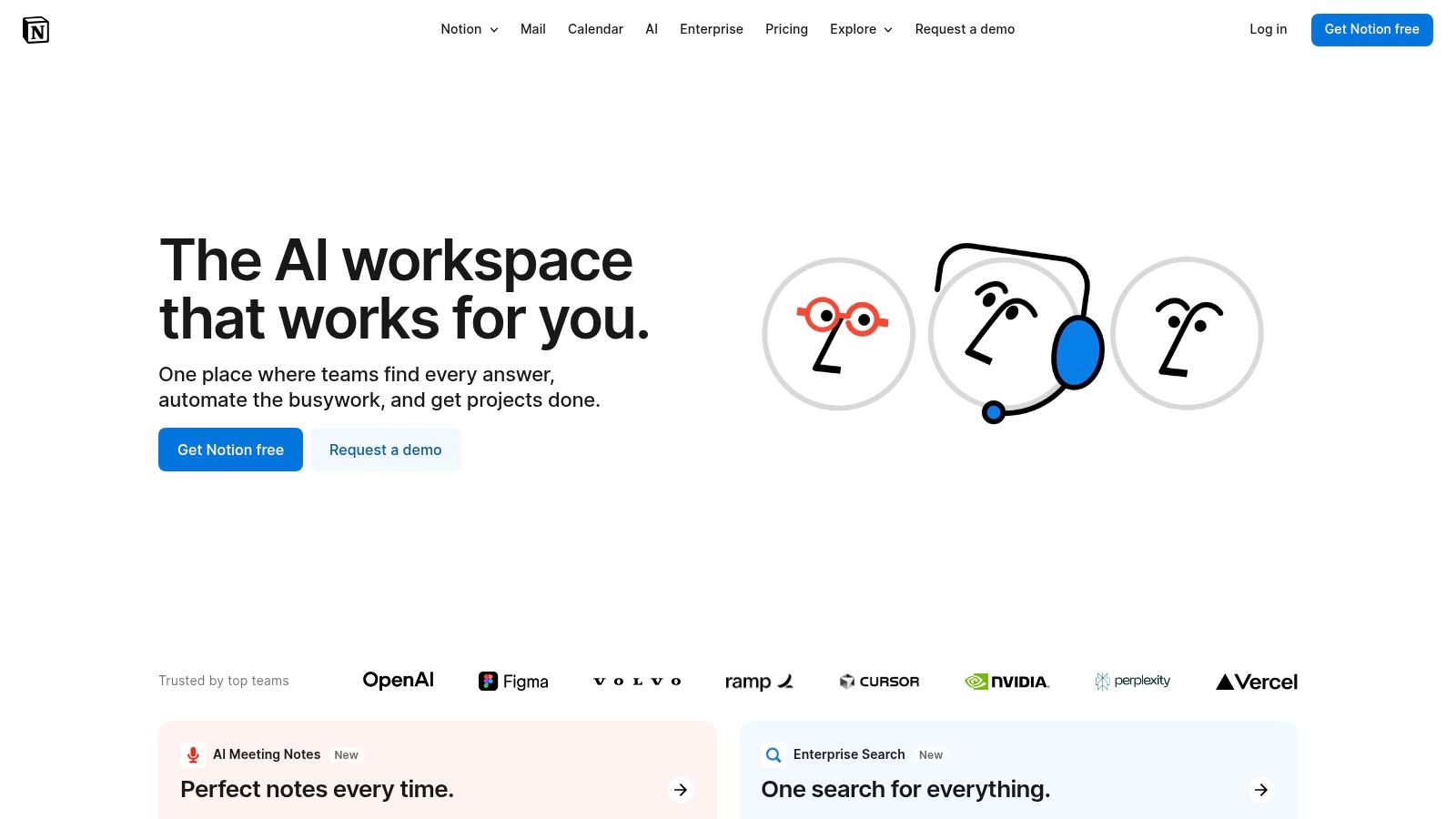
Unlike more structured PM tools, Notion AI excels at unstructured work and knowledge management. It can turn messy meeting notes into clear action items, generate a project plan from a simple brief, or translate technical jargon for non-technical stakeholders. This makes it an ideal central hub where project planning, documentation, and execution coexist seamlessly, reducing the need to switch between different applications for different tasks.
Key Features & Use Cases
- AI-Assisted Writing and Editing: Use Notion AI to draft project proposals, write status updates, fix grammar, or change the tone of a document instantly.
- Intelligent Summaries: Quickly get the gist of long project documents, meeting minutes, or research pages without reading every word.
- Customizable Databases and Views: Build powerful task managers using databases with Kanban, list, calendar, and timeline views tailored to your team's workflow.
- Centralized Knowledge Base: Create a "single source of truth" for all project-related information, from initial briefs to final reports, all searchable and interconnected.
Limitations and Pricing
Notion’s greatest strength, its flexibility, can also be a weakness. It requires a significant initial setup time to build effective workflows, which can be daunting for new teams. Additionally, its offline functionality is limited, which can be an issue for users who need to work without a consistent internet connection.
Notion offers a generous Free plan for individuals. The Plus plan, starting at $8 per user/month (billed annually), is designed for small teams. The Business plan is $15 per user/month, and Enterprise offers custom pricing. Notion AI is available as an add-on for $8 per member/month when billed annually.
Website: https://www.notion.so/
5. Wrike
Wrike positions itself as a robust, enterprise-grade work management platform, making it one of the best AI tools for project management for teams handling complex, large-scale initiatives. Its AI capabilities are strategically focused on de-risking projects and optimizing resource allocation. Wrike’s AI, branded as "Work Intelligence," analyzes project data to predict potential delays, flag at-risk tasks, and offer smart suggestions for automation, setting it apart for organizations that prioritize proactive risk management over generative text features.
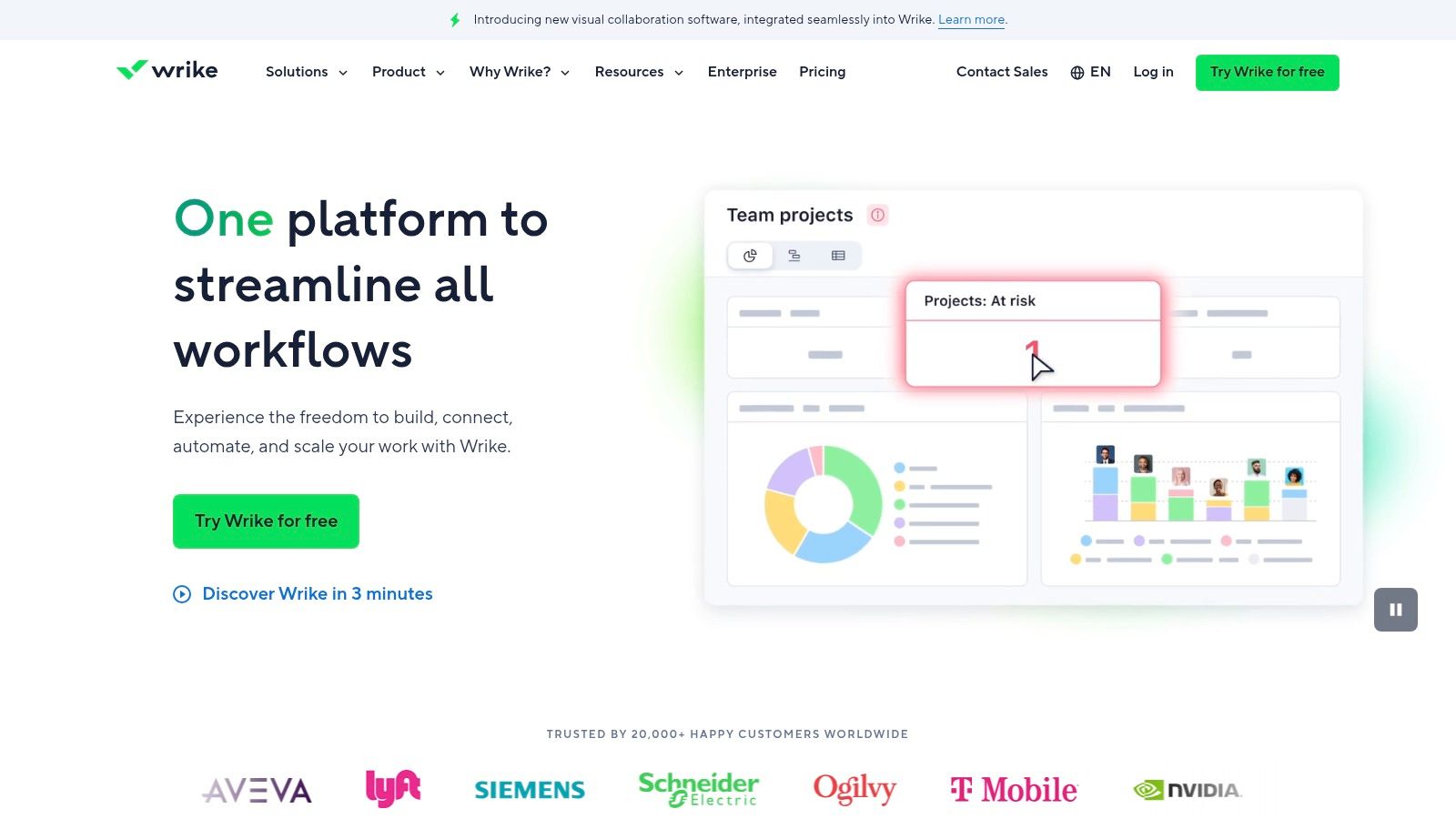
This platform excels in environments where detailed reporting and cross-departmental visibility are crucial. The AI doesn't just automate simple tasks; it provides a layer of predictive insight that helps managers make more informed decisions. For instance, it can automatically process incoming requests, route them to the correct team based on workload and skills, and generate performance reports that highlight potential bottlenecks before they escalate.
Key Features & Use Cases
- AI-Driven Risk Prediction: Wrike's AI scans project plans and progress to identify tasks with a high probability of delay, allowing managers to intervene early.
- Smart Resource Optimization: The system suggests how to best reallocate resources or adjust timelines when new, high-priority work is added, helping maintain team balance.
- Custom Workflows & Automation: Build powerful, automated workflows that can handle approvals, task assignments, and status updates without manual intervention.
- Advanced Reporting and Analytics: Generate in-depth, customizable reports and dashboards that provide stakeholders with a clear view of project health and team performance.
Limitations and Pricing
The platform's advanced features, particularly in analytics and customization, contribute to a steeper learning curve compared to more straightforward tools. Its pricing structure is also geared more towards established teams and enterprises, which may make it cost-prohibitive for small businesses or startups.
Wrike offers a limited Free plan for small teams just getting started. Paid plans begin with the Team tier at $9.80 per user/month. The Business plan, at $24.80 per user/month, unlocks most of the platform's key features, including automation and reporting. Enterprise and Pinnacle plans offer custom pricing for organizations needing advanced security, analytics, and AI capabilities.
Website: https://www.wrike.com/
6. Monday.com
Monday.com shines as a highly visual and flexible Work OS (Work Operating System) that has seamlessly integrated AI to boost team productivity. Its strength lies in its intuitive, color-coded interface that allows teams to build custom workflows for virtually any project or process. With the introduction of Monday AI, the platform now acts as an intelligent assistant, capable of automating repetitive tasks, generating content, and providing actionable summaries, making it one of the best AI tools for project management for teams that prioritize clarity and customization.
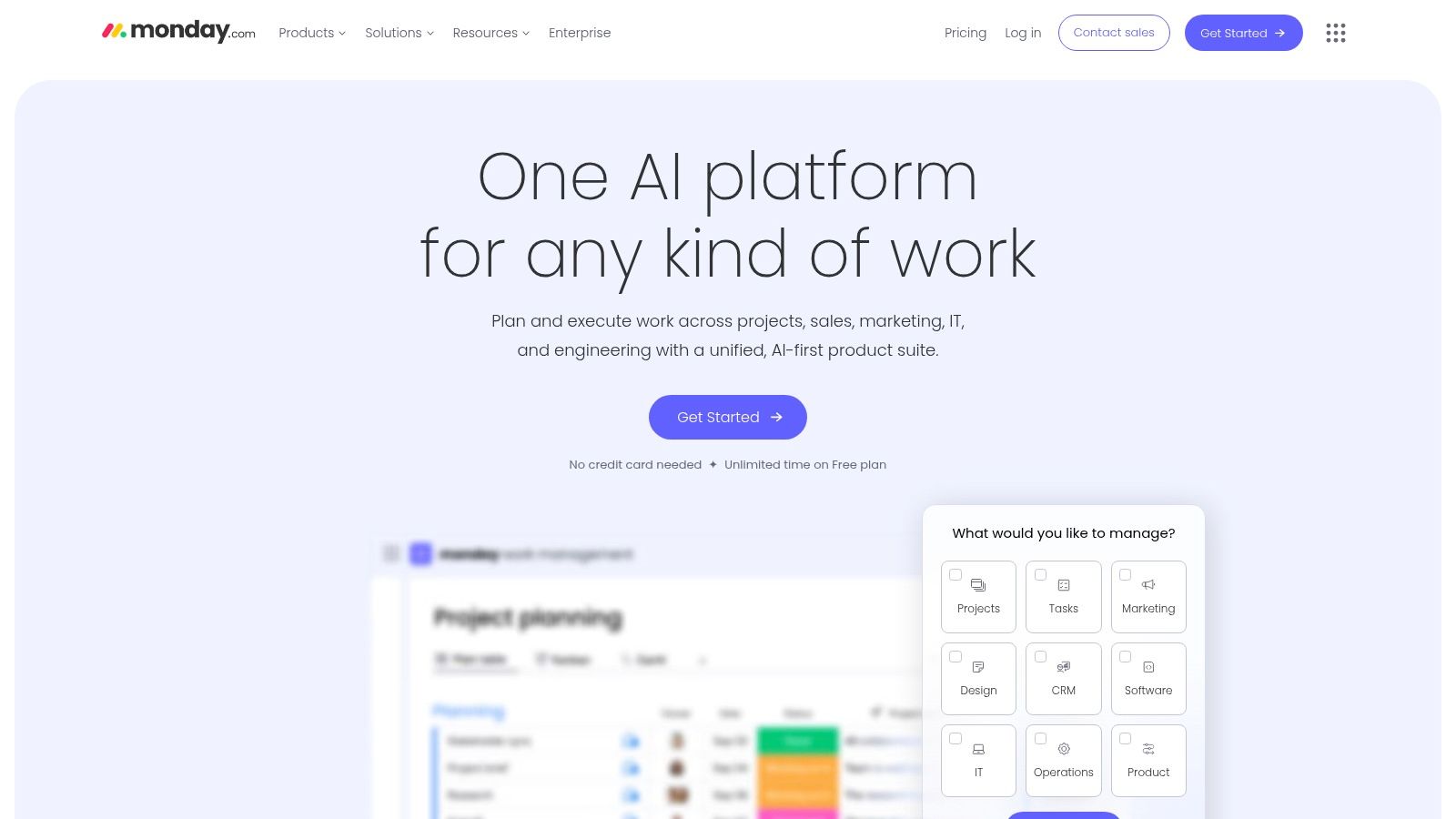
The platform's AI is designed to be a collaborative partner. For example, it can help draft emails to stakeholders, create complex formulas for tracking budgets, or automatically generate a task list from a brainstorming session. This allows teams to spend less time on manual setup and data entry and more time on strategic work. For organizations like digital agencies, this level of automation and customization is invaluable, as you can discover more in this review of project management software for digital agencies.
Key Features & Use Cases
- AI Task Generation: Automatically break down larger project goals into manageable, detailed tasks and subtasks, complete with descriptions.
- Content and Communication Aid: The AI assistant can compose and rephrase emails, summarize long updates, and ensure professional communication across all channels.
- Customizable Workflows & Dashboards: Build visual project boards, timelines, and dashboards that are perfectly tailored to your team’s specific needs and track progress at a glance.
- Powerful Automations: Set up "if-this-then-that" automation recipes to handle recurring tasks, send notifications, and move items through a workflow without manual intervention.
Limitations and Pricing
While incredibly user-friendly, Monday.com’s true power is unlocked in its higher-tier plans, which can make it cost-prohibitive for smaller teams or startups on a tight budget. Some of the most advanced AI features are also reserved for these premium plans.
Monday.com offers a free plan for up to 2 users. Paid plans start with the Basic tier at $9 per seat/month, moving up to the Standard plan at $12 per seat/month, which is their most popular. The Pro plan at $19 per seat/month adds more advanced features, with custom pricing for the Enterprise plan. Monday AI is available as an add-on to all paid plans, with pricing varying based on the plan and number of users.
Website: https://monday.com/
7. Taskade
Taskade positions itself as a unified workspace for real-time collaboration, blending tasks, notes, and communication into a single, intuitive interface. What makes it one of the best AI tools for project management is its "AI Agent" and suite of AI-powered commands, which are designed to function as an extension of your team. This tool excels at transforming unstructured ideas into organized project plans, mind maps, and actionable task lists, making it ideal for teams focused on creative brainstorming and rapid outlining.
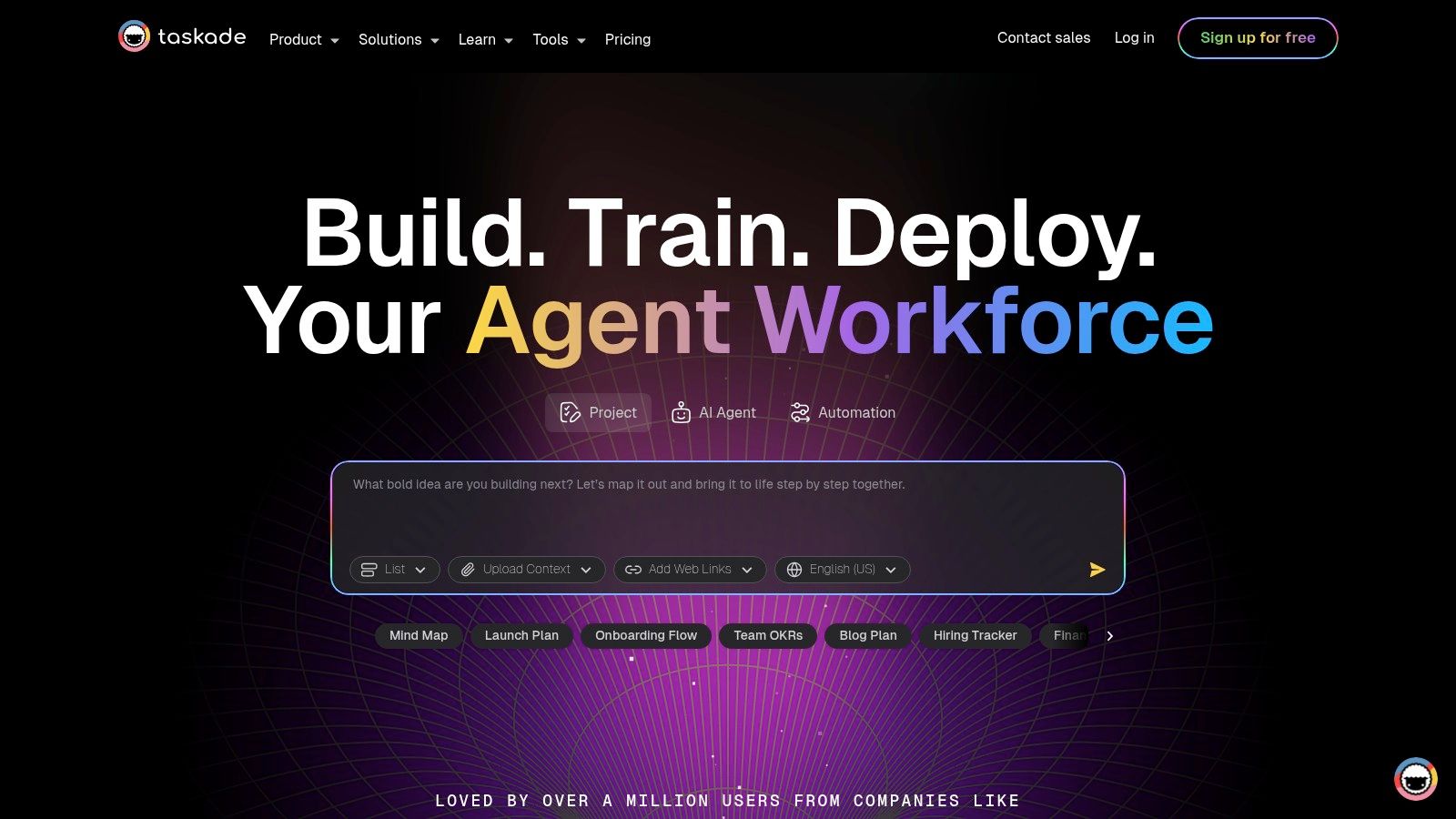
Its AI features are seamlessly integrated into the user workflow. You can use a simple prompt to generate a complete project structure, brainstorm marketing slogans, or create a content calendar. The platform’s unique strength lies in its visual and flexible approach, allowing teams to instantly switch between task lists, boards, mind maps, and organizational charts, all while collaborating in real-time with an integrated video chat.
Key Features & Use Cases
- AI Project Generation: Use the AI agent to create comprehensive project workflows, task lists, and mind maps from a single descriptive command.
- Real-time Collaboration: Work on documents and task lists with team members simultaneously, with changes reflected instantly for everyone.
- Multi-Format Views: Seamlessly switch between List, Board, Mind Map, and Org Chart views to visualize project data in the most effective format.
- Integrated Communication: Host video calls and chats directly within a project space, keeping all communication and context in one place.
Limitations and Pricing
While Taskade is very user-friendly, its core focus is on task management and collaboration rather than deep, data-driven project analytics found in more complex systems. The file storage is also quite limited on lower-tier plans, which could be a constraint for media-heavy projects.
Taskade offers a Free plan with limited AI credits and storage, suitable for individuals or small teams. The Starter plan is $4 per user/month, increasing limits. The Plus plan at $8 per user/month offers unlimited AI credits and more storage. Custom Enterprise plans are also available for larger teams needing advanced security and integrations.
Website: https://www.taskade.com/
8. Trello
Trello is renowned for its visually intuitive Kanban-style boards, making it a favorite for teams that value simplicity and clarity in their workflows. While traditionally a manual tool, its evolution now includes AI capabilities through its Butler automation and various Power-Ups, solidifying its place among the best AI tools for project management for less complex needs. The platform excels at visualizing task progression from "To Do" to "Done," providing an at-a-glance overview that is perfect for agile teams and straightforward projects.
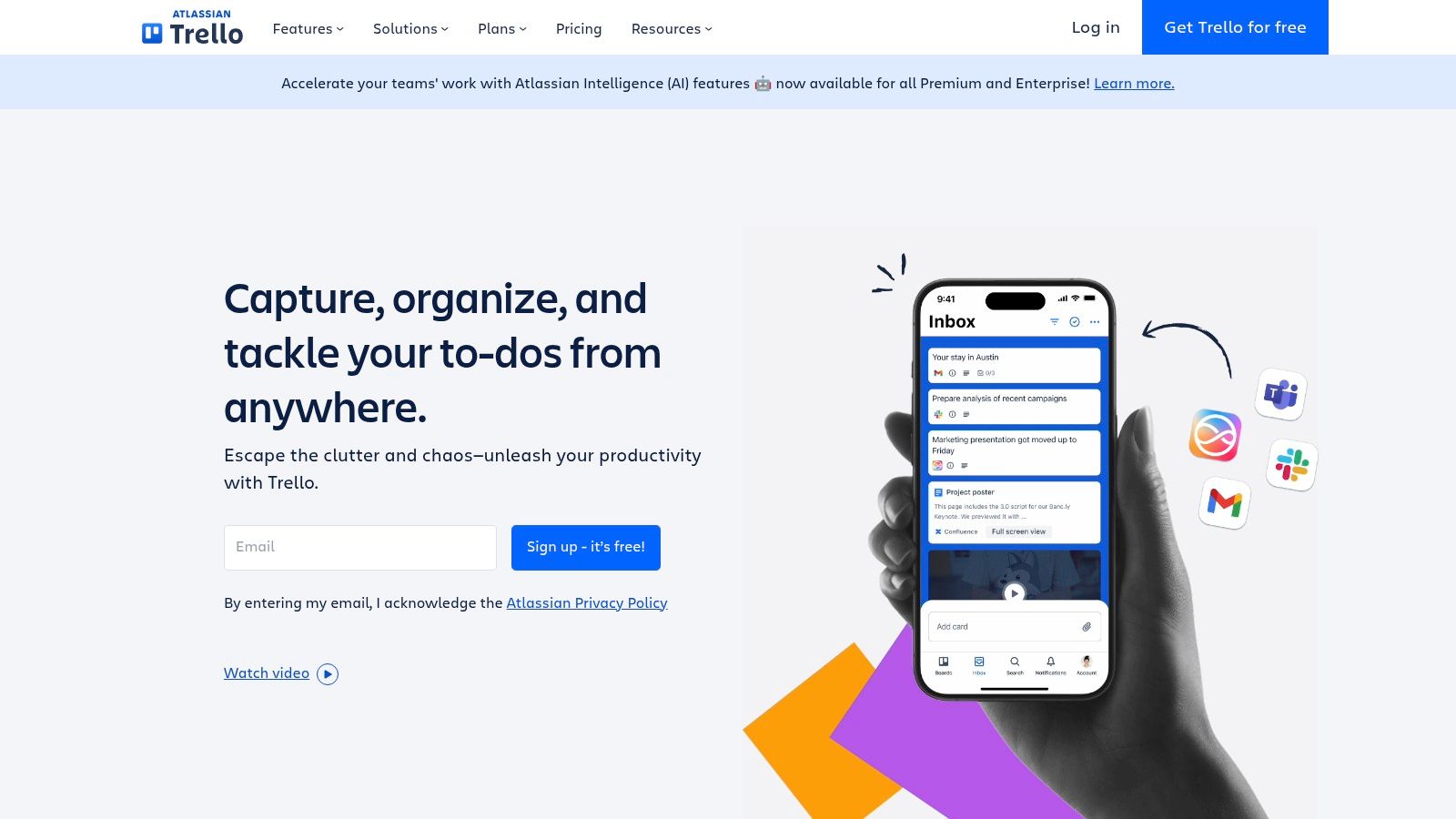
Trello’s AI, primarily through Butler, automates repetitive tasks within its board structure. For example, you can create rules that automatically move a card to the "In Review" column when a specific team member is tagged, or set commands to generate a checklist of subtasks when a card is labeled "New Feature." This rule-based automation reduces manual drag-and-drop actions, freeing up time for more critical thinking and execution. Its strength lies in making a simple system even more efficient without adding complexity.
Key Features & Use Cases
- Butler Automation: Create rule-based triggers and actions to automate card movements, due date assignments, and notifications without any coding.
- AI-Powered Content Generation: Through integrations and Power-Ups, users can generate task descriptions, checklists, or comment summaries directly within a Trello card.
- Kanban-Style Boards: The core of Trello is its highly visual and user-friendly boards, which allow for easy tracking of tasks as they move through different stages.
- Extensive Integrations (Power-Ups): Connect Trello with tools like Slack, Jira, and Google Drive to create a centralized, collaborative hub for project information.
Limitations and Pricing
Trello's simplicity is also its primary limitation. It lacks the advanced reporting and analytics features found in more robust platforms, making it less suitable for highly complex projects requiring deep performance insights. The Kanban-only view can also be restrictive for teams needing Gantt charts or list-based planning.
Trello offers a great Free plan with up to 10 boards per workspace. Paid plans start with the Standard tier at $5 per user/month (billed annually), adding unlimited boards and advanced checklists. The Premium plan at $10 per user/month introduces more views like Calendar and Dashboard, while the Enterprise plan starts at $17.50 per user/month for enhanced security and organizational controls.
Website: https://trello.com/
9. Microsoft Project with Copilot
For teams deeply embedded in the Microsoft ecosystem, the integration of Copilot into Microsoft Project transforms a classic enterprise tool into a modern powerhouse among the best AI tools for project management. Copilot acts as an intelligent assistant within Project, leveraging AI to help managers assess risks, monitor progress, and generate status reports with natural language prompts. Its key advantage is the seamless, native integration with the broader Microsoft 365 suite, pulling data and context from Teams, Outlook, and Planner.
This AI integration is designed to handle the complexities of enterprise-level planning. For instance, Copilot can analyze your project plan and suggest resource reallocations to prevent bottlenecks or identify tasks that are falling behind schedule. This shifts the manager's role from manual data crunching to strategic decision-making, powered by AI-driven insights. It helps answer complex "what-if" scenarios, making it invaluable for large-scale, dynamic projects.
Key Features & Use Cases
- AI-Driven Project Forecasting: Use natural language to ask Copilot to identify potential risks, forecast deadlines, and generate project summaries based on existing data.
- Resource Management Suggestions: The AI can analyze team workloads across the Microsoft 365 environment and recommend optimal resource assignments to keep projects on track.
- Timeline Management and Gantt Charts: Automatically generate and adjust complex project timelines and Gantt charts by describing the goals and constraints in plain English.
- Integration with Microsoft 365: Copilot connects Project with Teams, Planner, and Outlook for unified communication, task management, and reporting. Learning how this integration works is key to increasing team productivity.
Limitations and Pricing
The primary limitation is its dependence on the Microsoft 365 ecosystem; it offers little value to teams using other productivity suites. Its powerful, enterprise-focused features can also present a steep learning curve and may be overly complex for small teams or straightforward projects.
Microsoft Project is available through several subscription plans. Project Plan 1 starts at $10 per user/month. More advanced features are in Project Plan 3 ($30 per user/month) and Project Plan 5 ($55 per user/month). Copilot for Microsoft 365 is a required add-on, priced at an additional $30 per user/month, and requires a Microsoft 365 Business or Enterprise license.
Website: https://www.microsoft.com/en-us/microsoft-365/project
10. Motion
Motion carves out a unique niche among the best AI tools for project management by focusing intensely on the individual's schedule. Instead of just managing projects, it acts as an intelligent time manager, using AI to automatically plan your day by scheduling tasks directly into your calendar. Its primary goal is to eliminate the constant back-and-forth of manual planning, ensuring that high-priority work gets done without requiring you to constantly shuffle your schedule.
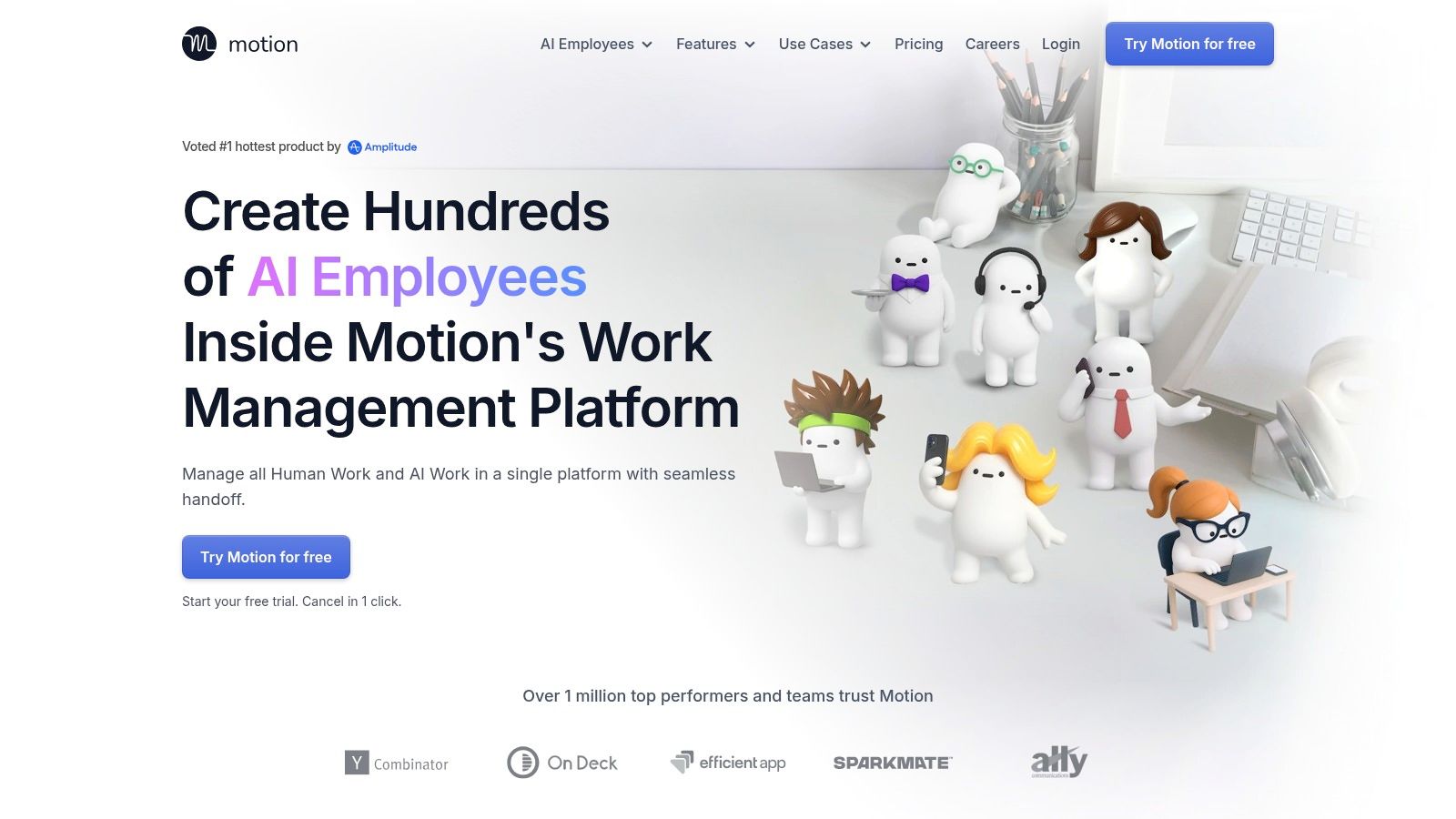
The platform’s strength lies in its dynamic, automated scheduling. When a new meeting pops up or an urgent task arises, Motion’s AI doesn't just add it to a list; it intelligently reshuffles your entire schedule to accommodate the change, finding the optimal new slots for your existing tasks. This makes it an excellent choice for busy professionals, founders, and executives who need to protect their focus time while managing a fluid and unpredictable workload.
Key Features & Use Cases
- AI-Powered Task Prioritization: Automatically organizes your to-do list and schedules tasks into available calendar slots based on priority and deadlines.
- Automated Schedule Adjustments: If a meeting runs long or a new one is added, Motion automatically reschedules your tasks to fit the new timeline.
- Smart Meeting Assistant: Suggests optimal meeting times for all attendees by analyzing everyone's calendar availability, significantly reducing scheduling friction.
- Calendar Integration: Seamlessly integrates with Google Calendar and Microsoft Outlook, creating a single, unified view of your commitments and tasks.
Limitations and Pricing
While powerful for individual time management, its customization options are limited compared to more comprehensive project management tools. Users have also noted that sorting and managing multiple projects within a workspace can become cumbersome as the number of projects grows.
Motion offers a 7-day free trial. After the trial, the Individual plan is available for $19 per month (billed annually), and the Team plan costs $12 per user/month (billed annually), adding features for collaborative project and task management.
Website: https://www.usemotion.com/
11. Smartsheet
Smartsheet takes a unique, spreadsheet-inspired approach to project management, empowering teams that are comfortable with grid-based data organization. It integrates powerful AI capabilities to transform its familiar interface into one of the best AI tools for project management, focusing on workflow automation and intelligent data analysis. Smartsheet excels at managing complex, data-heavy projects where tracking metrics, dependencies, and resources in a structured format is critical for success.
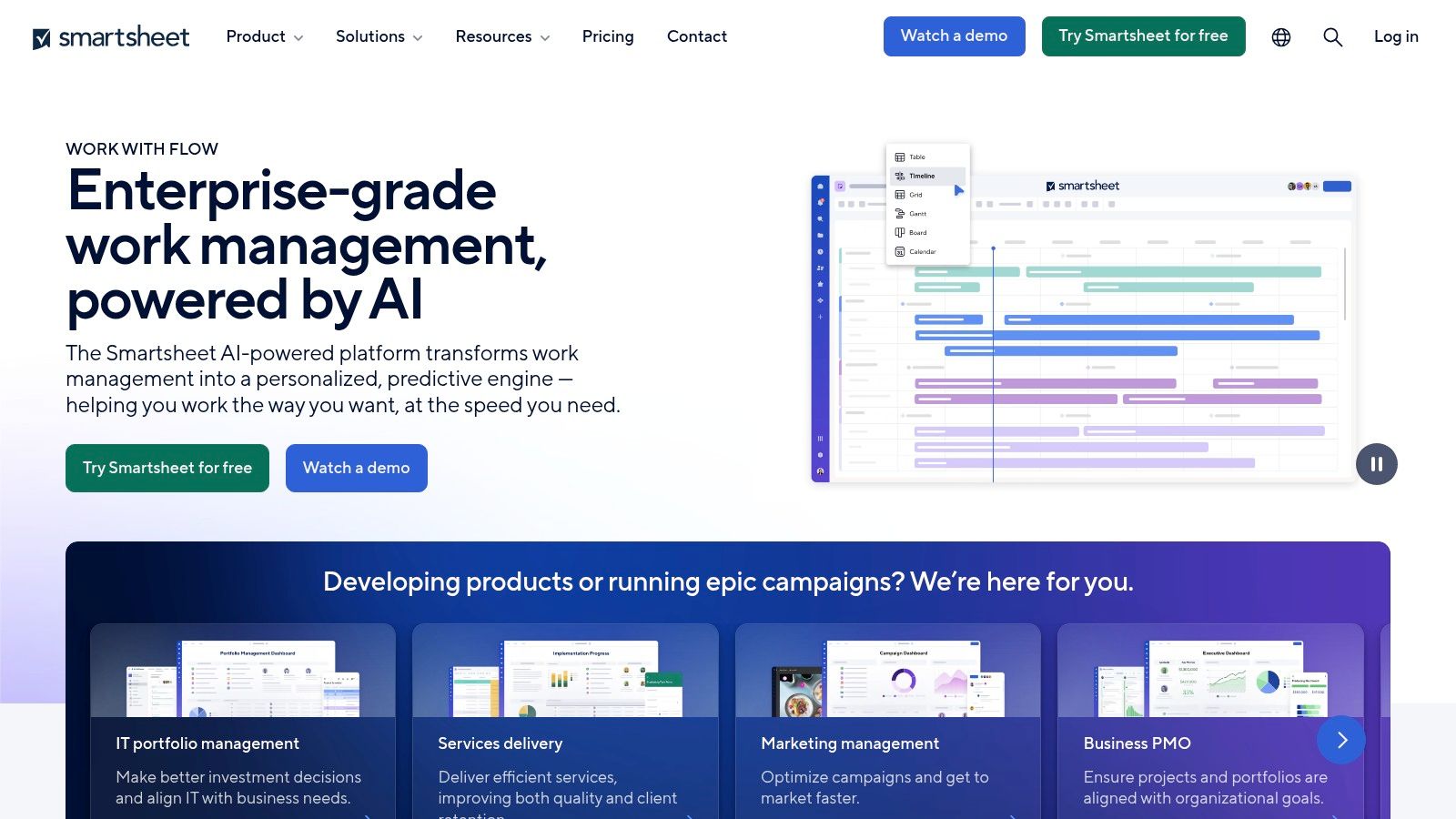
The platform's AI features are designed to automate repetitive tasks and provide predictive insights directly within your project sheets. For example, you can set up automated workflows that trigger actions based on cell changes, such as sending approval requests or archiving completed rows. The AI also analyzes project data to identify trends, forecast completion dates, and flag potential risks, helping managers make proactive, data-driven decisions without leaving their primary workspace.
Key Features & Use Cases
- AI-Driven Workflow Automation: Create intelligent, automated workflows to manage approvals, update stakeholders, and move tasks through stages based on predefined triggers and conditions.
- Data Analysis and Reporting: The AI can analyze large datasets within your sheets to generate insightful reports, dashboards, and charts, highlighting key performance indicators and project health.
- Predictive Analytics: Use historical project data to forecast timelines and identify potential bottlenecks, allowing for better planning and resource management.
- Intelligent Resource Allocation: Gain visibility into team workloads and use AI-powered suggestions to allocate resources effectively across multiple projects, preventing overallocation.
Limitations and Pricing
While the spreadsheet-like interface is a major pro for many, it can present a significant learning curve for teams not accustomed to this format, feeling less intuitive than kanban-first tools. Additionally, many of the most impactful AI and advanced features are gated behind the higher-tier, more expensive plans.
Smartsheet's pricing begins with a Free plan for a single user. The Pro plan starts at $7 per user/month (billed annually), offering more capacity for small teams. The Business plan, at $25 per user/month, unlocks most of the automation and reporting features, while the Enterprise plan provides custom pricing for organizations needing premium support and security.
Website: https://www.smartsheet.com/
12. Linear
Linear is a project management tool built with an opinionated, developer-first philosophy. It's engineered specifically for high-performing software teams who value speed, efficiency, and a structured approach to building products. While not a generalist PM tool, its focused design and recent integration of AI features make it one of the best AI tools for project management within the software development niche. Its core strength is its obsession with eliminating friction from the development cycle, from issue tracking to release management.
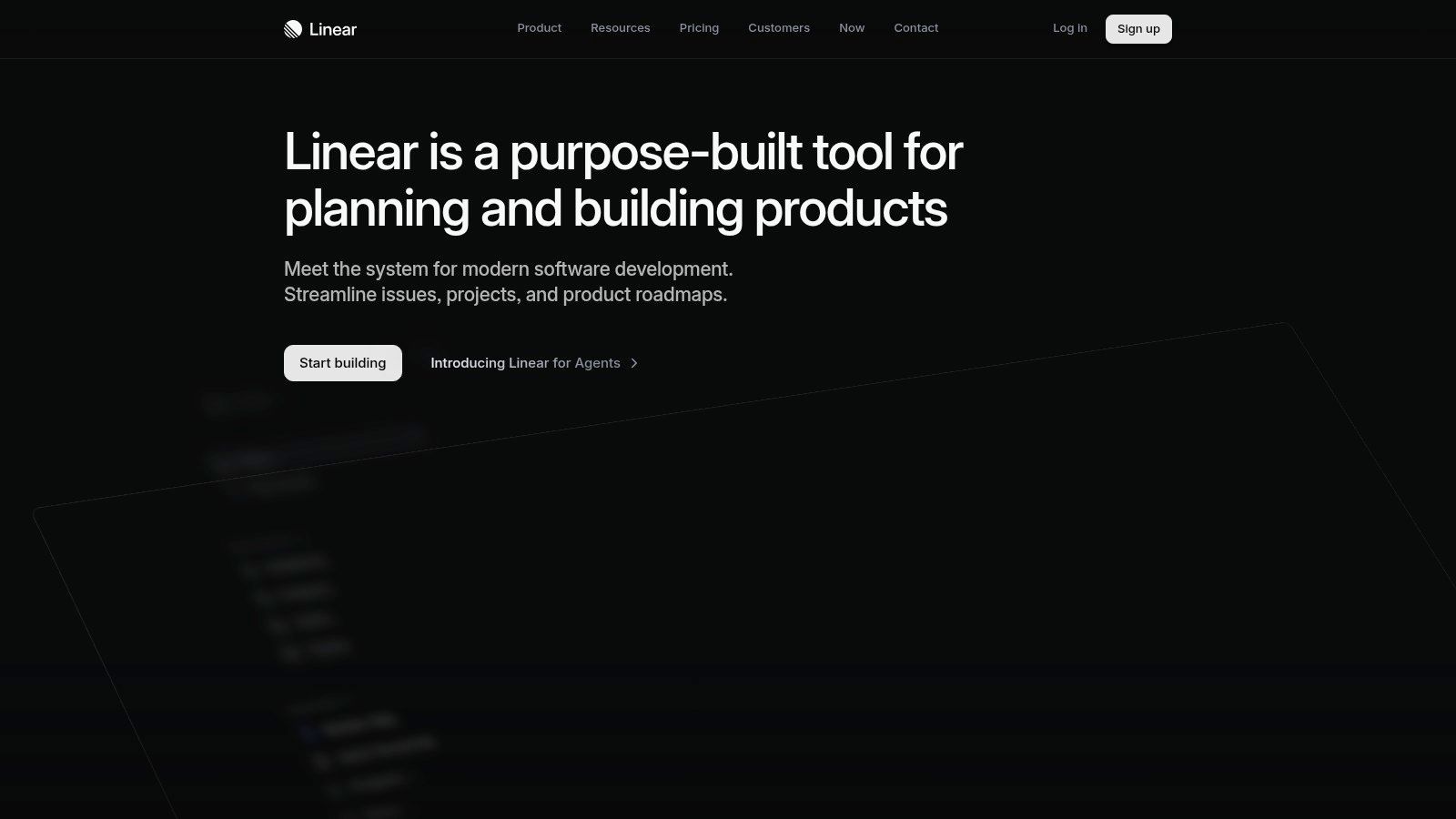
The platform’s AI, known as Linear AI, is seamlessly integrated into common workflows like creating issues and writing updates. For example, it can take a screenshot of a bug and automatically generate a descriptive issue title and summary, saving valuable developer time. This user-centric, streamlined approach ensures that AI enhances productivity without adding complexity, allowing engineers to stay focused on coding rather than administrative tasks.
Key Features & Use Cases
- AI-Assisted Issue Creation: Automatically draft bug reports or feature requests from brief descriptions, screenshots, or even Loom recordings.
- Cycles & Roadmaps: Manage sprints (Cycles) and visualize long-term product strategy with integrated roadmaps, keeping the entire team aligned.
- Automated Triage: A built-in triage inbox helps teams quickly process incoming bug reports and feature requests from various sources like Slack or customer support channels.
- Keyboard-First Design: The entire interface is designed for speed, with powerful keyboard shortcuts that allow users to navigate and manage tasks without touching a mouse.
Limitations and Pricing
Linear's greatest strength is also its main limitation: its hyper-focus on software development makes it less suitable for marketing, sales, or general business projects. The platform is intentionally rigid in its workflows, offering limited customization compared to more flexible tools like ClickUp or Asana.
Linear offers a Free plan for up to 10 members, which is ideal for small teams or startups. The Standard plan is $10 per user/month, adding unlimited members and larger file uploads. The Plus plan, at $19 per user/month, includes advanced features like SAML SSO and priority support. Linear AI is available as an add-on for $10 per user/month on all plans.
Website: https://linear.app/
AI Project Management Tools Feature Comparison
| Product | Core Features | User Experience | Value Proposition | Target Audience | Price & Plans |
|---|---|---|---|---|---|
| Streamline Project Management Using AI Automation | Tailored AI frameworks, end-to-end docs, hands-on support | Scalable, reduces errors, boosts collaboration | Replace manual workflows, accelerate delivery | B2B & SaaS businesses | Custom pricing; setup/train investment |
| ClickUp | AI task automation, predictive analytics, customizable views | Versatile, real-time collaboration | Efficient workflows, free plan for small teams | Teams of all sizes | Free and paid plans available |
| Asana | AI workflow automation, project insights, app integrations | Visual tracking, strong collaboration | Streamlines workflows, robust free tier | SMBs and enterprise teams | Free and premium plans |
| Notion | AI content creation, customizable workspace, real-time collab | Flexible, knowledge management | Combines notes & projects, free plan | Teams & individuals | Free and paid tiers |
| Wrike | AI risk prediction, resource optimization, advanced reporting | Enterprise-ready, multilingual | Scalable platform, deep analytics | Enterprises & large teams | Premium pricing |
| Monday.com | AI task automation, custom workflows, tool integrations | User-friendly, highly customizable | Streamlines teams, strong integrations | SMBs to enterprises | Tiered pricing; higher tiers for advanced features |
| Taskade | AI task management, mind maps, video chat | Easy to learn, organized knowledge base | Collaboration with free plan | Small teams & individuals | Free and paid plans |
| Trello | AI content generation, task boards, integrations | Simple, user-friendly | Easy project tracking, free version | Small teams & individuals | Free and paid plans |
| Microsoft Project with Copilot | AI forecasting, resource suggestions, Microsoft 365 integration | Deep integration, powerful | Advanced project & resource management | Microsoft 365 users, enterprises | Requires Microsoft 365, paid |
| Motion | AI task prioritization, schedule automation, calendar integration | Improves time management | Automates planning, smart scheduling | Busy professionals & teams | Paid plans |
| Smartsheet | AI workflow automation, data analysis, predictive analytics | Spreadsheet-like, customizable | Flexible data-driven project management | Enterprise & data-centric teams | Tiered pricing |
| Linear | AI collaboration, bug triage, sprint management | Streamlined, user-centric | Tailored for software dev workflows | Software development teams | Paid plans |
Final Thoughts
Navigating the landscape of AI-powered project management can feel like charting new territory. We've explored a diverse array of platforms, from comprehensive work hubs like ClickUp and Asana to specialized powerhouses like Motion and Linear. The core takeaway is clear: the era of purely manual project oversight is rapidly coming to an end. The best AI tools for project management are no longer just a futuristic concept; they are tangible, accessible solutions transforming how B2B and SaaS teams operate.
The key is not to find a single "perfect" tool, but to identify the right tool for your specific workflow, team size, and strategic goals. For a startup focused on rapid development cycles, Linear's opinionated approach might be ideal. In contrast, a large digital agency juggling complex client projects might find the customizable, all-in-one power of Wrike or Smartsheet more suitable.
Recapping Key Insights and Choosing Your Path
As you reflect on the options presented, from the versatile intelligence of Notion AI to the enterprise-grade power of Microsoft Project with Copilot, remember that the true value of AI in this space isn't just about automating tasks. It's about augmenting human intelligence. These tools are designed to handle the repetitive, administrative burdens so your team can focus on what they do best: creative problem-solving, strategic planning, and innovation.
To help you make a final decision, consider these guiding questions:
- What is our primary pain point? Are we struggling with resource allocation, deadline slippage, communication silos, or a lack of visibility into project progress? Pinpoint your biggest challenge to find a tool that solves it directly.
- How complex are our projects? Simple task lists and collaborative documents may only require the AI features in Trello or Taskade. Multi-stage, cross-departmental initiatives will demand the robust capabilities of a platform like Monday.com or ClickUp.
- What is our team's tech-savviness? A tool with a steep learning curve can hinder adoption. Prioritize platforms known for intuitive design and strong user onboarding if your team is less familiar with complex software.
- How important is integration? Your project management tool must coexist with your existing tech stack (CRM, communication apps, code repositories). Assess the integration capabilities of each contender to ensure a seamless workflow.
Implementing AI for Maximum Impact
Successfully integrating one of these platforms is about more than just purchasing a subscription. It requires a strategic rollout. Start small by piloting the tool with a single, tech-forward team. Use their experience to create best practices and internal documentation before expanding company-wide.
Key Consideration: True ROI comes from adoption. Invest time in training your team not just on how to use the tool, but why its AI features will make their work easier and more impactful. Frame it as a way to eliminate drudgery, not replace judgment.
The future of project management is intelligent, predictive, and automated. By embracing these advancements, you aren't just adopting new software; you are fundamentally upgrading your organization's operational capacity. You're building a more resilient, efficient, and forward-thinking team prepared for the demands of modern business. The right tool will empower your team to achieve more with less friction, turning ambitious goals into tangible results.
Ready to connect your new AI project management tool to the rest of your tech stack? While these platforms offer powerful internal automation, MakeAutomation helps you build complex, no-code workflows that bridge the gaps between all your essential business applications. Supercharge your chosen PM tool by integrating it seamlessly with your CRM, marketing platforms, and more at MakeAutomation.




